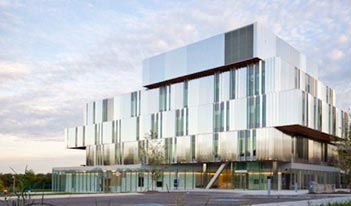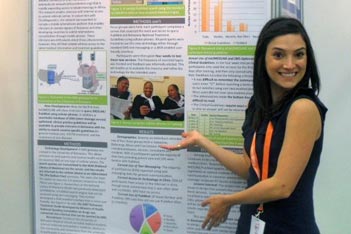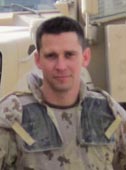RESIDENTS' CORNER
Katie Armstrong grew up in Toronto, then lived in
Chicago and Cleveland, returning to Mississauga when
she was 13 years old, where she was an honor student and
volunteer. She is very enthusiastic about the Mississauga
medical school campus and its beautiful new building. “It
looks like it was made by Apple [a reference to the brilliant
talents of Apple’s Chief of Industrial Design Jonathan Ive].
The students love it. Instead of raising their hands, they
use an audience response system, so all are given a chance
to participate.” She was one of the first six students from
the Toronto campus to attend our new medical school in
Mississauga. She gave a talk to the entering class there on
the theme “The City of Mississauga already embraces you,
and I hope you will come to consider it your city”.
 Mississauga Academy of Medicine
Katie has participated as a facilitator in Pier Bryden’s
popular ethics seminars for undergraduate medical students
- supported in this activity by her program director in
Plastic Surgery, Mitch Brown. She wants to be an academic
surgeon with a focus on telemedicine, teaching, and healthcare
management. She has done research in telemedicine
at the University of Pennsylvania, where she worked on
the identification of dermatologic diseases using cell phone
images sent in to a central diagnostic unit from various free
clinics across Philadelphia. The Philadelphia patients were
referred to the Wal-Mart $4 formulary for their medications.
As a senior medical student, she continued this work
in Botswana, where the University of Pennsylvania maintains
a program of continuous telemedicine coverage.
Katie became fascinated with surgery during a rotation
as a third year student on general surgery where she
“learned that I could actually do things to help people.
This was followed by an amazing experience in Plastic
Surgery with Stefan Hofer”. She enjoys the reconstructive nature of Plastic Surgery, especially free flaps and
other complex interventions.

Katie speaking at a MedInfo conference in Cape Town about her
telemedicine experience
In her spare time, she snowboards, runs, and attends a
fitness bootcamp in Mississauga with her mother and two
sisters. She has read all of Atul Gawande’s books, Collins’
“Good to Great” and is currently reading “MBA in a Book”
She likes the efficiency introduced by telemedicine and is
interested in time management in the OR. She hopes to do
an MBA or MSc in Health Technology during her Surgeon
Scientist period.
|

Dylan Pannell
|
Dylan Pannell is a first year
general surgery resident and a
third generation military man,
whose great grandfather and
grandfather served in the Boer
War and the 1st and 2nd World
Wars. “The profession of arms
is a true vocation. It carries
danger and allows service to
country, while working with
great people. Trust in your fellow
soldiers is the dominant value of the vocation”.
“The Afghanistan campaign has defined a generation
of young Canadians who are now war veterans; all are
proud to have served. Canadian warriors are now serving
in a mentoring role, having completed their military
mission in Afghanistan. Because the country is tribal, no
one will be able to force a solution on the Afghan people.
It’s their country. We did the military component and
now it is a diplomatic mission.”
Dylan’s initial experience with surgery and the surgery
of trauma began when he was a medical student and later
a family practice resident at St. Michael’s Hospital. His
role model and mentor is Homer Tien (http://www.surgicalspotlight.ca/Article.aspx?
ver=Spring_2009&f=Main).
He met Homer in 2004 when he was a medical student
at Sunnybrook. They have published 8 papers together
on trauma. As a military surgeon, Dylan will be embedded
in a civilian hospital, as Homer is embedded at
Sunnybrook. There are military surgeons in similar positions
in Alberta, British Columbia, and Quebec. Dylan
will continue to do research on brain injury, building
on his PhD background in molecular genetics, secured
at the Hospital for Sick Children. He meets regularly
with researchers in the US, focusing on brain injury and
combat trauma.
Another important mentor was Colonel Howard
Coombs, “a PhD war historian and a great officer and
thinker in the airborne regiment.” Coombs is a professor
of strategy at the Royal Military College in Kingston.
Following undergraduate training at the University of
Toronto, Dylan completed a PhD at the Hospital for
Sick Children, working with James Ellis and Howard D.
Lipschitz. Dylan describes his experience at the Hospital
for Sick Children as “a phenomenal opportunity to be on
the cutting edge of the world in research, surrounded by
amazing staff. World experts were just down the hall.” He
started as a summer student and then entered the graduate
program and completed a PhD. He was writing his PhD
thesis on September 11th 2001. He entered the military,
completed basic training and went to Afghanistan.
The military offered him an opportunity to complete
medical school and his enlisted colleagues pushed him to
do so. “Sir, we need doctors. Go to medical school.” “I
was an ivory tower dweller in the scientific world, when
the world changed and I became a soldier, then a doctor
and then a surgeon. My two vocations are as a soldier - to
serve my country, and as a doctor to serve my patients.
A basic lesson I have learned is that life can change in
unexpected ways. I plan to use research to help soldiers,
emphasizing tactical combat trauma care, something
you can write about only if you’ve been there. Military
surgical care is now well developed. The survival rate is
98% if a soldier gets to the Kandahar hospital, but there
is a new population of injured soldiers. We are teaching
them through the “Soldier On” program (see also http:// www.cfpsa.com/en/psp/soldieron/index.asp). We teach
them to use their prostheses and to regain a normal life.
They are 100% motivated. ”
Dylan developed a sense of the broad scope of
medicine in his family practice training and on military
assignment in the Arctic at 83 degrees north, where he
handled every aspect of care of his troops even including
dental care. He also learned to operate on dog soldiers
injured in Afghanistan. He is an enthusiastic supporter
of the broad training that he received in family practice.
Griff Pearson and Bob Bell had similar background
experience as family practitioners and emergency room
doctors before entering their surgical training.
Dylan’s hobbies are hunting, fishing, canoeing and running.
He is married to Kellie, an emergency room doctor
in Georgetown; they have a two year old daughter Sophie.
|